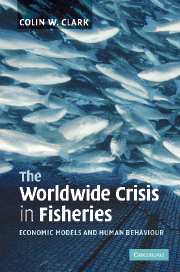1 - Perspective
Published online by Cambridge University Press: 03 February 2010
Summary
The proper study of mankind is man, said Pope. Yet our understanding of human behavior remains imperfect, if not rudimentary.
One theoretical development of the mid-twentieth century that has helped to improve our understanding of behavior is the theory of games (von Neumann and Morgenstern 1947; Nash 1951, 1953), which is now widely used in economics, and also in evolutionary biology (Maynard Smith 1982). Although I do not make extensive direct use of game theory in this book, I do emphasize that the economically motivated behavior of fishermen must be considered as an integral component of any fishery system.
Unfortunately, the economic theory of commercial fisheries is still widely misunderstood. Many fishery management programs have failed dismally to achieve their objective of conserving fish stocks. Although the specific reasons for a given failure are seldom apparent, it seems clear that in many cases the failure was fully predictable on basic economic principles.
To put the matter succinctly, many management programs have not attempted to deal directly with the economic motives that always underlie overfishing. Indeed, many programs may have inadvertently increased the motivation for overfishing. In addition, these programs have often encouraged the development of excess fishing capacity, now recognized as a major problem in world fisheries.
Let me be more explicit. First, it is self-evident that an unregulated open-access renewable resource stock will, if it is marketable, be exploited and perhaps depleted. Simply stated, if money can be made by catching fish in a certain area, those fish will sooner or later be caught.
- Type
- Chapter
- Information
- The Worldwide Crisis in FisheriesEconomic Models and Human Behavior, pp. 7 - 29Publisher: Cambridge University PressPrint publication year: 2007



